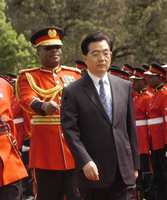Africa's longstanding position as the forgotten continent is rapidly being transformed. At the heart of this dramatic change is the rise of economic giants in the developing world -- China, India and Brazil, in particular -- whose state-owned enterprises and private companies, acting in combination with assertive diplomacy, have forged a growing partnership with Africa. Under the rubric of "South-South cooperation," these emerging powers have made significant inroads into Western economic and political dominance on the continent. While the media has tended to focus on the dislocating effect that competitive emerging powers have had on key sectors of African economies and the concomitant political support for authoritarianism, the reality is much more complex.
Driven by a need for resources and markets, these emerging powers are acutely conscious of their own development challenges and, correspondingly, those facing Africa. This perspective informs their approach to the continent, which is both unashamedly mercantilist and inspired by notions of solidarity. Their pursuit of resources and investment in infrastructure has reignited a debate on the prospects for enhancing regional economic cooperation across the continent. Finally, the inclusion of South Africa into the BRIC grouping -- comprised of Brazil, Russia, India and China -- in late-2010 puts an African voice at the core of the world's most dynamic economies as they consider a range of pressing global issues.
Africa and South-South Economic Cooperation

